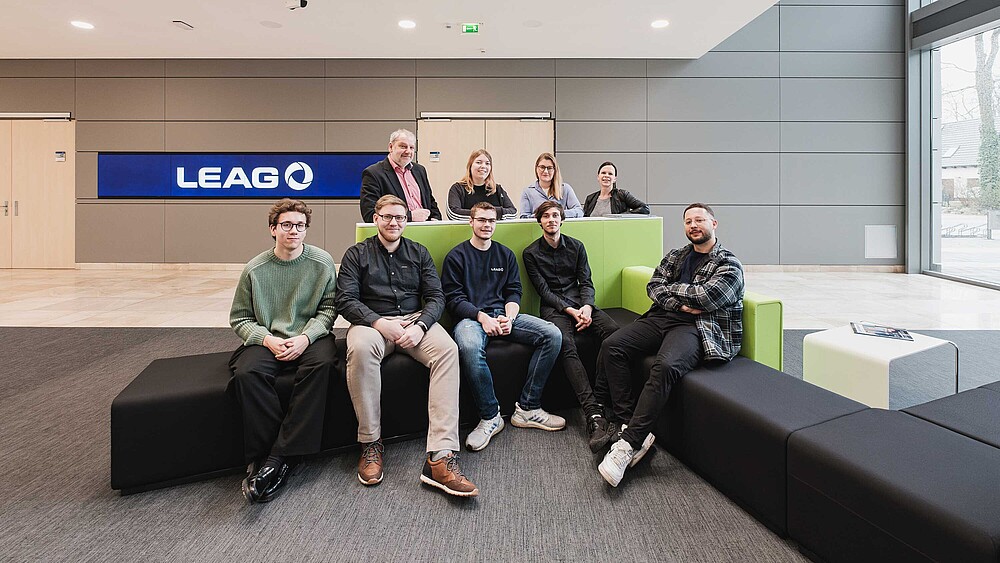Introducing the KIAdirekt model at cooperation partner LEAG.

In Cottbus, a city characterized by its industrial and academic landscape, an exciting interview took place with representatives from Lausitz Energie Kraftwerke AG (LEAG), Germany's second largest electricity producer, and students from the Zittau/Görlitz University of Applied Sciences (HSZG). This conversation offered insights into the KIAdirekt model, a practice-integrated degree program that creates a link between academic education and practical experience in the fields of computer science and green engineering. The skills acquired during the course have a broad and dynamic field of application at LEAG, which is systematically shifting its portfolio towards the expansion of renewable energies.
At the heart of the dual study program are the students, whose individual stories and decisions shed light on how diverse the paths can be that lead to this future-oriented form of education.
Matt-Jared Schreck, born and raised near Cottbus, deliberately chose the practice-integrated degree course in computer science in order to experience the practical relevance that his family's tradition at LEAG suggested to him. He describes his experience at the HSZG as intensive and personal, an atmosphere that is fostered by the compact structure of the university and the direct contact with the lecturers.
Samuel Raak, with roots in Rietschen, used the KIAdirekt model in computer science as the basis for his professional career. During the practical phases at LEAG, he discovered his interest in a department that he had not previously considered - power plant analytics in the field of data science. Initially without any concrete idea of what his professional future might look like after graduation, the practical experience enabled him to hone his professional interests. These insights led him to know exactly which area he wanted to specialize in. Today, he is permanently employed in the department that matches his skills and inclinations, where he contributes his specialist knowledge.
Jeremy Rohde from Forst was looking for a course of study that would give him practical experience after 13 years of theoretical schooling. His decision to join the dual study program at LEAG confirmed his desire to apply theoretical knowledge directly in practice.
Eddy Zickow and Mohamed Abdellaoui share their special stories in the Green Engineering department. Eddy, who was looking for a course of study that would offer him future prospects, found the ideal combination of ecological responsibility and technical progress in the new Green Engineering course. By combining process engineering (40%), mechanical engineering (40%) and environmental engineering (20%), he learns everything he needs to know for a successful circular economy. By taking a holistic approach to the life cycle of products and the associated processes, you will deal with key methods in the technical field as well as current trends.
Mohamed, originally from Tunisia, was attracted by the versatility of the Green Engineering degree program, which deepened his interest in sustainable technologies and energy systems.
The dual study program in the KIAdirekt model is designed so that students experience a structured alternation between theoretical phases at the university and practical phases at the company. This model enables students to apply the knowledge they acquire at the HSZG directly in practice at LEAG and vice versa.
Theory phases
During the theoretical phases, students attend lectures and seminars at the Zittau/Görlitz University of Applied Sciences. These phases are designed to provide students with in-depth specialist knowledge in their respective degree courses. For computer science students, this includes programming, software development and data analysis, while green engineering focuses on topics such as sustainable production processes, renewable energies and ecological materials science.
Practical phases
The practical phases take place during the lecture-free period in LEAG companies. During this time, students work in various departments of the company, which gives them the opportunity to gain insights into different areas of work and apply what they have learned. The practical phases are specifically geared towards the degree courses and enable students to work on projects that are useful both for their academic training and for the company.
Linking theory and practice
A key aspect of the KIAdirekt model is the close integration of theoretical and practical phases. This is promoted, among other things, by projects and final theses that are carried out in direct cooperation with LEAG. This enables students to apply their academic knowledge directly in real work contexts and at the same time gain valuable professional experience.
Beyond the individual experience, the dual study program at LEAG offers numerous advantages: A work-life balance, which is promoted by the separation of study and practical phases; financial independence during the course; and a deep rootedness in practice, which facilitates the transition into professional life.
This form of study enables students to build up valuable networks during their studies and gain insights into possible career paths. Samuel Raak, for example, found his calling in a field that was previously foreign to him, while Mohamed Abdellaoui appreciated the opportunity to combine theory and practice without having to deal with the challenges of a parallel job.
The KIAdirekt model impressively demonstrates how close collaboration between industry and academia can be a win-win for all involved. By integrating practical experience into the course, graduates are produced who are not only theoretically adept, but also familiar with the real requirements of the company.
This type of training, as practiced by LEAG and HSZG, not only offers immense benefits for the students, but also serves as a beacon project for the industry to integrate talented, well-trained young people directly into the workforce. Companies considering similar models can learn from this example and help improve education and career prospects for the next generation.
By enabling young people to combine their academic education with valuable work experience, LEAG and HSZG are actively helping to shape a more sustainable, technologically advanced future. This model serves not only the students and the organizations involved, but also society as a whole by laying the foundation for a good educated, dedicated and innovative workforce.